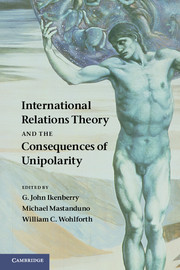Book contents
- Frontmatter
- Contents
- Figures
- Tables
- Notes on the contributors
- Notes on the editors
- 1 Introduction: unipolarity, state behavior, and systemic consequences
- 2 Unipolarity, status competition, and great power war
- 3 Legitimacy, hypocrisy, and the social structure of unipolarity: why being a unipole isn't all it's cracked up to be
- 4 Alliances in a unipolar world
- 5 System maker and privilege taker: US power and the international political economy
- 6 Free hand abroad, divide and rule at home
- 7 The liberal sources of American unipolarity
- 8 Unipolarity: a structural perspective
- 9 Unipolarity and nuclear weapons
- 10 From unipolarity to multipolarity: transition in sight?
- 11 Sell unipolarity? The future of an overvalued concept
- Index
- References
3 - Legitimacy, hypocrisy, and the social structure of unipolarity: why being a unipole isn't all it's cracked up to be
Published online by Cambridge University Press: 05 June 2012
- Frontmatter
- Contents
- Figures
- Tables
- Notes on the contributors
- Notes on the editors
- 1 Introduction: unipolarity, state behavior, and systemic consequences
- 2 Unipolarity, status competition, and great power war
- 3 Legitimacy, hypocrisy, and the social structure of unipolarity: why being a unipole isn't all it's cracked up to be
- 4 Alliances in a unipolar world
- 5 System maker and privilege taker: US power and the international political economy
- 6 Free hand abroad, divide and rule at home
- 7 The liberal sources of American unipolarity
- 8 Unipolarity: a structural perspective
- 9 Unipolarity and nuclear weapons
- 10 From unipolarity to multipolarity: transition in sight?
- 11 Sell unipolarity? The future of an overvalued concept
- Index
- References
Summary
One would think that unipoles have it made. After all, unipolarity is a condition of minimal constraint. Unipoles should be able to do pretty much what they want in the world since, by definition, no other state has the power to stop them. In fact, however, the United States, arguably the closest thing to a unipole we have seen in centuries, has been frustrated in many of its policies since it achieved that status at the end of the Cold War. Much of this frustration surely stems from non-structural causes – domestic politics, leaders’ poor choices, bad luck. But some sources of this frustration may be embedded in the logic of contemporary unipolarity itself.
Scholarship on polarity and system structures created by various distributions of power has focused almost exclusively on material power; the structure of world politics, however, is social as much as it is material. Material distributions of power alone tell us little about the kind of politics states will construct for themselves. This is particularly true in a unipolar system, where material constraints are small. Much is determined by social factors, notably the identity of the unipole and the social fabric of the system it inhabits. One would expect a US unipolar system to look different from a Nazi unipolar system or a Soviet one; the purposes to which those three states would use preponderant power are very different. Similarly, one would expect a US unipolar system in the twenty-first century to look very different from, say, the Roman world, or the Holy Roman Empire (if either of those counts as a unipolar system). Social structures of norms concerning sovereignty, liberalism, self-determination, and border rigidity (among other things) have changed over time and create vastly different political dynamics among these systems. Generalizing about the social structure of unipolarity seems risky, perhaps impossible, when so much depends on the particulars of unipole identity and social context, but in the spirit of this project, I will try.
- Type
- Chapter
- Information
- Publisher: Cambridge University PressPrint publication year: 2011
References
- 2
- Cited by



